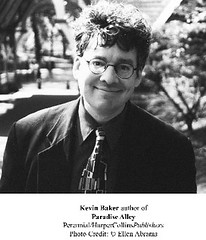Around two months ago I came across one of few DOE people I know who still have a modicum of influence.
When I recommended reading Striver's Row to her and the wonderful experience of having Kevin Baker speak to teachers she became enthused. It seemed that there was this big event: The 5th Annual Curriculum, Community, Collaboration & Celebration Conference A Conference for New York City Public School Educators & Concerned Citizens, Presented by Teachers Network and Deputy Chancellor Carmen Fariña, on April 8th and they were looking for authors to address the teachers. Kevin would have been perfect for the high school grouping. Could I try to reach him she asked? It took a while to reconnect with Kevin-he was away on a book tour-but he gladly accepted the basically pro bono offer. But wait- I was then told they had enough authors and couldn't use Kevin. Check out this list: William Somerset (K-8 )W. Somerset Maugham's "The Fall of Edward Barnard": A Study Guide from Gale's "Short Stories for Students" Elizabeth Mann (3-8) Empire State Building: A Wonders of the World Book Robert Weinstock (K-3)Gordimer Byrd's Reminder Judy Goldschmidt (3-8) Raisin Rodriguez and the Big-Time Smooch Jean Yee Lew (K-5) Millicent Min, Girl Genius Pooja Mikajani (6-12) Javaka Steptoe (K-12)In Daddy's Arms I Am Tall: African Americans Celebrating Fathers.
Now here's an excerpt from award winning reviewer Allen Barra on Striver's Row: Historical fiction generally falls into one of two categories — melodramatic potboilers or lead-footed social tracts. Kevin Baker, the best writer of historical fiction currently practicing — E.L. Doctorow not excepted — sees the possibilities for something more. Baker's novels are filled with the sights, sounds and smells of worlds that even great writers such as Henry James don't know exist, worlds that produce real people who make history. Strivers Row is the third and final entry in what the author calls his "City of Fire" trilogy, and it will send new readers scurrying for the first two novels: Dreamland, which takes place around the turn of the last century with old Coney Island as its backdrop; and Paradise Alley, which is set further back in time in the New York of the Civil War draft riots and is the story of the gangs of New York that Martin Scorsese should have filmed. Strivers Row is the most daring of the three, an attempt to reconstruct the world that produced Malcolm Little, as he was known when he left Michigan for Harlem during World War II, the man who would change America as Malcolm X.
Once again, "Where's Spartacus?"
Monday, April 17, 2006
Subscribe to:
Post Comments (Atom)







No comments:
Post a Comment